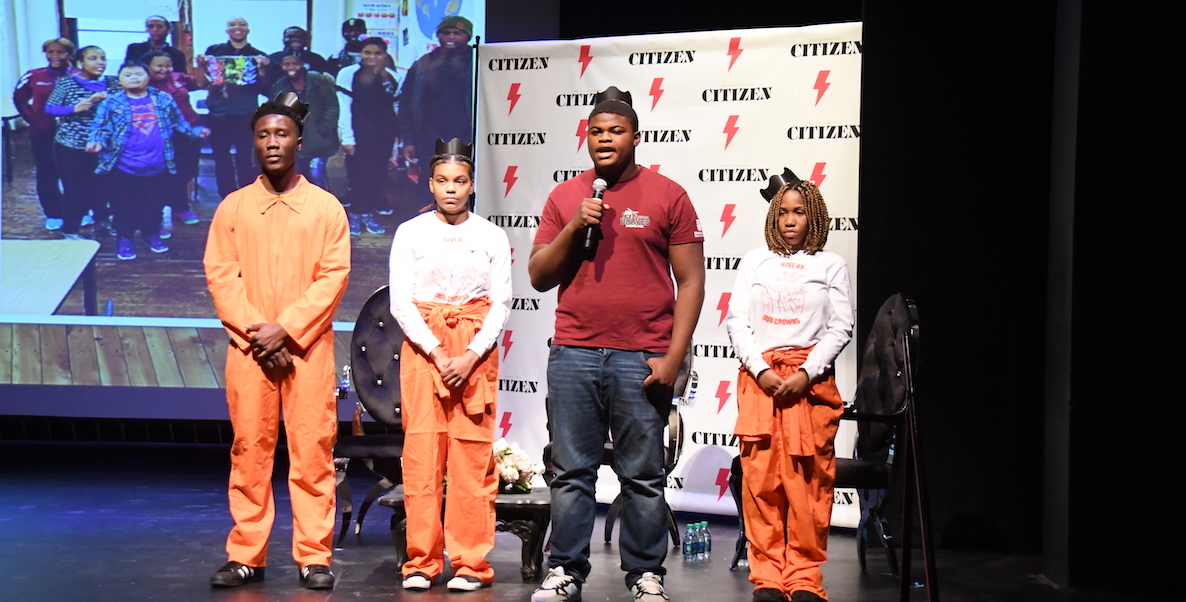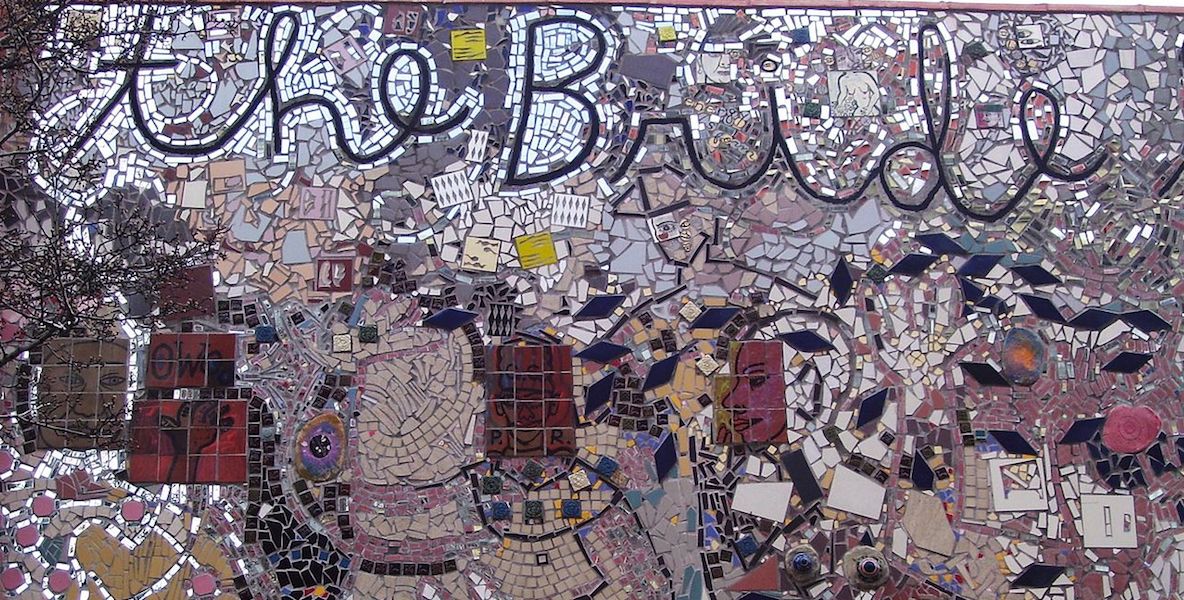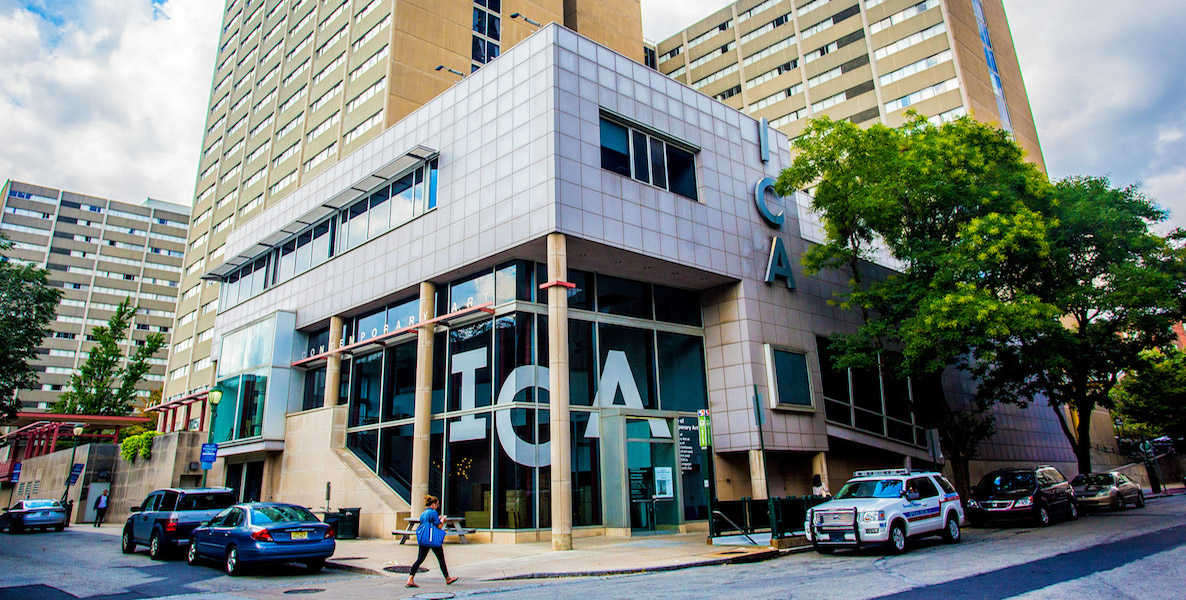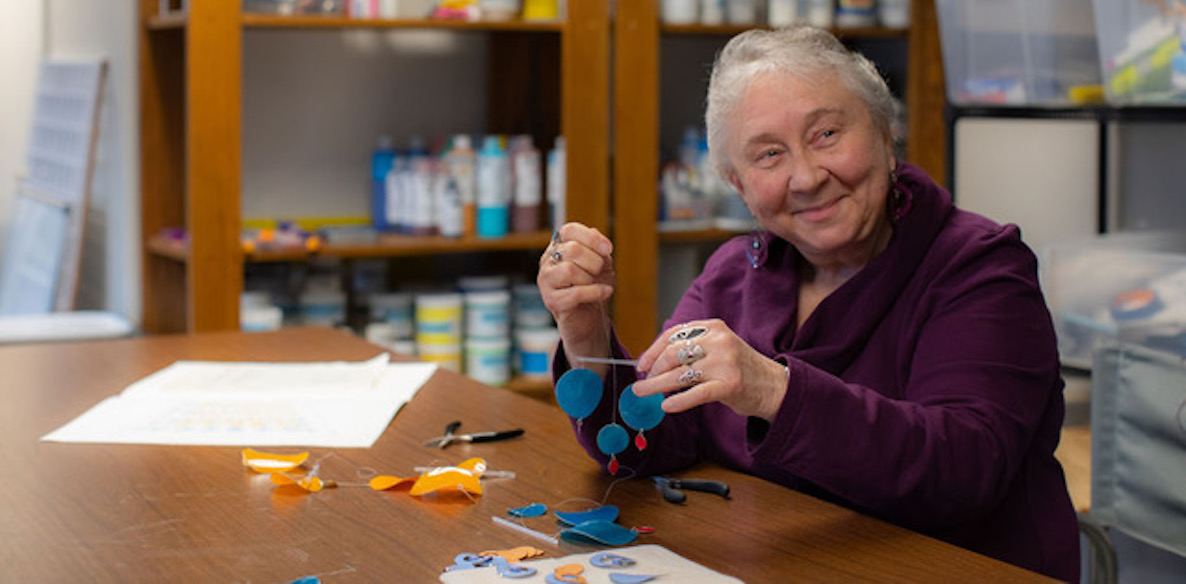There are paintings everywhere in Farooq Hassan’s modest apartment: on the floor, on dressers, on the kitchen table where he drinks coffee every day. His mixed-media paintings, colorful collages that blend abstract and reality, mostly feature women whom he believes are “a symbol of everything good in life.”
Hassan, 79, is a renowned Iraqi artist. He has exhibited abroad in cities such and London and Amman, and in his home country at the National Art Museum. For years he was the stamp designer for the Iraqi post office. Yet, he had to leave it all behind when the political strife in Iraq became too dangerous for him and his family. In 2010, he immigrated to Oregon and started anew.
“At first I was afraid of the future. I didn’t know what would happen. Would people welcome me and accept my artwork?” he says. “Then a friend told me about The Geezer Gallery. It is now everything for me.”
The Geezer Gallery in Portland, Oregon celebrates established and emerging masterful older artists, as well as provides art therapy programs to low-income older adults in the community. Amy Henderson, an interior designer-turned-gerontologist, founded the gallery in 2006 in the hopes of showing how our aging population isn’t as frail as we think.
“I wanted to change the narrative about what it means to grow older because we’re all growing older,” she says. “Older adults are some of the most creative, vital, and productive human beings.”
And they’re having a cultural moment. Just look at MoMA’s recent The Long Run exhibit, which focuses on artists creating well into their later years. Or the sudden fame of 103-year-old artist Carmen Herrera. There’s also the Carter Burden Gallery in New York City that exclusively showcases artists 60 and older.
A small study had promising results: participants walked faster, left their homes more, and increased their social activity when engaged in the program.
The Geezer Gallery has a similar focus. About 70 percent of the artists who submit make it past the jury selection process—over 300 in total to date. These days, you can find their work throughout Portland. But it took a few failed traditional galleries that were too far from the city’s art center or too costly to maintain for Henderson to get creative with community partnerships.
Artists Repertory Theatre, for one, gave them their lobby space six years ago where artists continue to create work in response to each production’s theme. A mega real estate company recently gifted them an abandoned Brooks Brothers storefront downtown to use as a pop-up gallery. And with the gallery’s new Art Vault consulting service, which targets established businesses and newly constructed buildings, they hope to be even more of a presence in the city.
The Geezer Gallery is fighting for the right to be seen. We’re a youth-obsessed culture. By flipping the word “geezer” from a negative to positive, Henderson believes not only artists, but everyone, can reclaim old age as a source of pride. Okay, she admits. Not everyone agreed with the name at first. She had to beg artists to sign with her. Now, while the word “geezer” still bristles some, she has to turn artists away.
![]()
Whether you agree with the name or not, there’s one thing we can all agree on: Our older adult population is exploding. According to the U.S. Census Bureau, they’re expected to outnumber youth for the first time by 2035. Already, many live check-to-check and rely heavily on Social Security—it’s not enough now, and it definitely won’t be enough in the future. Poverty among older Philadelphians, for example, is on the rise.
From housing to healthcare, we don’t have the infrastructure in place to support them, let alone creative outlets.
![]()
“People tend to not pay attention to older adults in terms of a programmatic standpoint. They think it’s already been done. We have Social Security. Medicare. Older Americans Act. Done,” says Paula Carder, Interim Director of Portland State University’s Institute on Aging. “Those programs fixed some things. But our society still isn’t prepared for people living 25-30 years into retirement.”
Philadelphia remains the poorest of the top 10 major cities as the cost of living in the U.S. continues to rise. While not a consistent source of income, The Geezer Gallery does aim to offset the burden. Sixty percent of gallery sales go to the artist, and the rest fund therapeutic art programs. In Hassan’s case, his paintings can sell anywhere from $150 for small reprints to upwards of $15,000 for larger original pieces.
The gallery has to work within the limits of Oregon’s subsidized healthcare income requirements, which means Hassan can’t get paid all at once. When he does, the extra funds go toward rent, medications, and of course, more canvas and paint. For many artists, Henderson says, appreciation from the public is even more valuable than the dollar.
Sixty percent of Geezer Gallery sales go to the artist, and the rest fund therapeutic art programs. In Hassan’s case, his paintings can sell anywhere from $150 for small reprints to upwards of $15,000 for larger original pieces.
Amanda Buonomo from Philadelphia Corporation for the Aging (PCA) agrees. Every May for the past 17 years, she’s been curating their “Celebrate Arts & Aging” festival for artists 55 and older. About 180 artists submitted last year, including 102-year-old award-winning painter Bernice Paul. Buonomo almost never turns anyone away.
She knows there are a lot more older artists among Philadelphia’s thriving arts and culture scene, and would love to expand. But it’s been challenging to find places to exhibit. City Hall, a maze of courtrooms and marriage license offices, has been a constant. “When people walk through City Hall and see this artwork, they stop and cannot believe that it’s done by senior citizens,” she says. “It blows their minds.” Last year, PCA artists also exhibited at West Philadelphia Senior Community Center, which has free art classes.
![]()
Research has shown how creating art can combat cognitive decline. That’s why a major part of The Geezer Gallery goes toward funding “Capturing Time,” an art therapy program in assisted living and retirement communities that Henderson co-created.
Over the course of 12 weeks, a trained facilitator helps residents make a bound book using art and storytelling techniques. Last summer they collaborated with the PreSERVE Coalition’s African American community around the theme of family soul-food recipes. They’ve also worked with veteran and LGBT communities, Alzheimer’s and intergenerational living facilities, and more. The last class is always a celebration.
“We have so many people who want this program. We have calls all the time,” says artist and Geezer Gallery Art Program Director Candyce Scott. “But we’re limited.” Sometimes family members will pay for extra classes. They’ve also tried a Train-the-Trainer model with Activity Directors, but because of high turnover rates, it’s been hard to sustain.
In 2014, they partnered with Oregon Health and Sciences University and Oregon Center for Aging and Technology to get data behind Capturing Time. Working with both an affordable housing and high-end retirement community, they installed wireless sensors on 40 people (vast majority white women) to track activities that correlate with loneliness—walking speed or phone use, for example.
“I wanted to change the narrative about what it means to grow older because we’re all growing older,” Henderson says. “Older adults are some of the most creative, vital, and productive human beings.”
The study was relatively small and homogenous, and didn’t have a control group. Despite its limitations, the results were promising: participants walked faster, left their homes more, and increased their social activity when engaged in the program.
Scott was a part of that study. At the time, she was in drug rehab. She’d come to the housing facility after losing her job as a computer technician, and a couple of stints in jail. One art class led to more art classes at a local community college, and the realization that art was a way to turn her life around.
Using a technique she developed, she started making kinetic sculptures—colorful, dangling strands that hang from the ceiling to create a feeling of calm in the viewer. She also went on to pursue a master’s in art and psychology, where she first met Henderson. Henderson knew immediately she wanted Scott’s work to be part of The Geezer Gallery.
“I didn’t know I had ‘work.’ The acknowledgment and appreciation of what I was doing and that there was value to it…that was huge,” Scott says. “There isn’t a day that goes by now that I don’t do something creative. It makes me feel whole again.”






